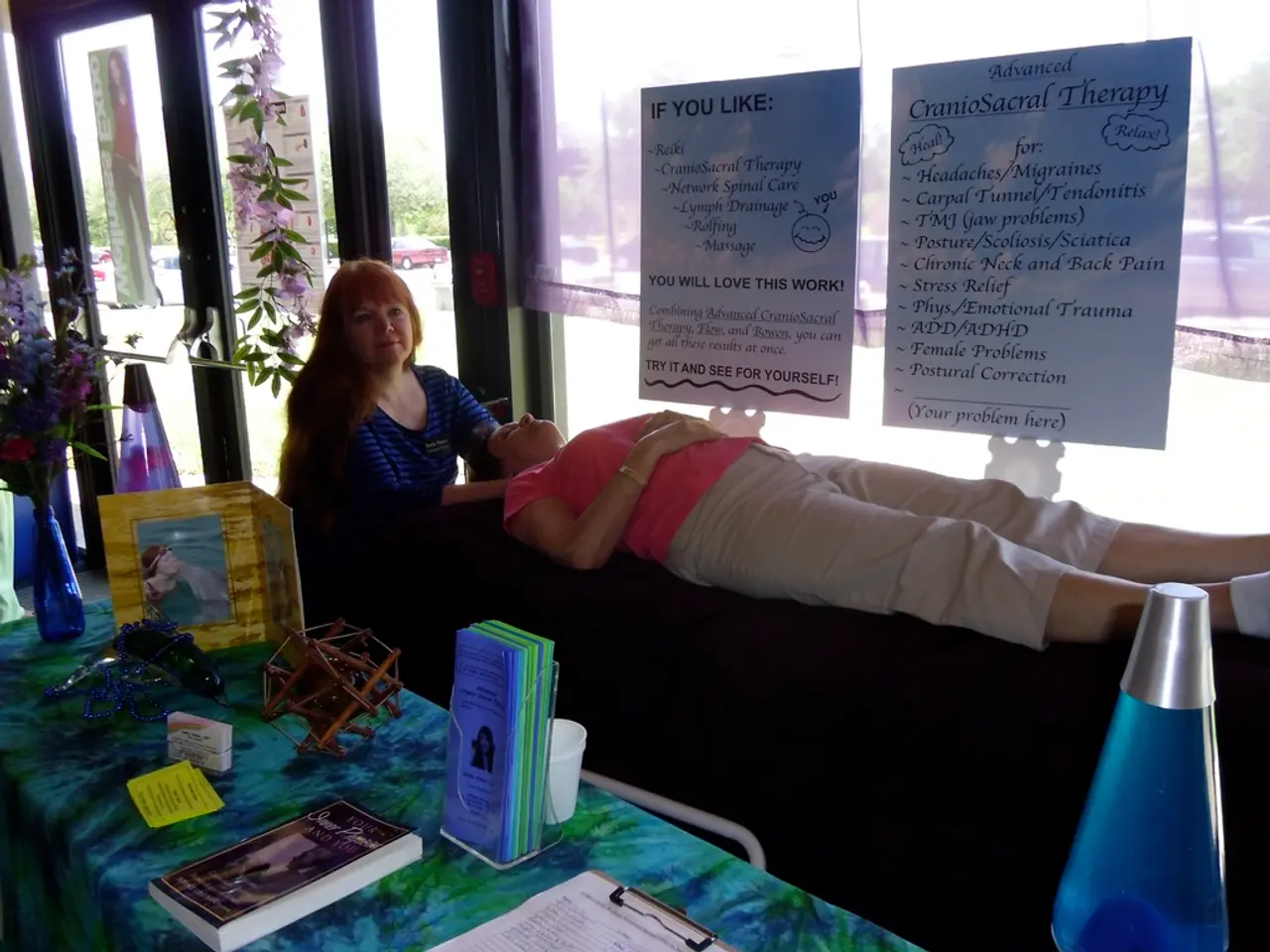Managing Peaceful Existence: Exploring Holistic Strategies to Combat Stress in the Year 2025
In 2025, many people are seeking ways to live a stress-free lifestyle. To help regain control and reduce stress, a digital detox could be beneficial. This means setting limits on screen time, turning off non-essential notifications, or designating "tech-free" zones or hours during the day.
However, to truly achieve a stress-free lifestyle, it is essential to integrate mindfulness, nutrition, exercise, sleep, nature, and strong relationships into daily routines. These components collectively build resilience, regulate stress hormones, and foster emotional balance.
Key Holistic Strategies
Mindfulness and Meditation
Practicing mindfulness through guided meditations, body scans, simple breathing exercises, and meditation helps lower cortisol (stress hormone) levels, improves concentration, and cultivates inner calm. Long-term mindfulness enhances emotional regulation and brain areas related to memory and empathy, making it easier to manage stress and anxiety.
Balanced Nutrition
Consuming a diet rich in colorful fruits and vegetables (like spinach and berries), lean proteins (such as salmon), and healthy fats (e.g., almonds, walnuts) supports mental health by reducing inflammation and enhancing brain function. Planning meals ahead and choosing whole foods over processed snacks are practical tips. Hydrating with water or herbal tea is preferable to sugary drinks.
Regular Exercise
Engaging in moderate physical activity such as brisk walking, cycling, swimming, yoga, or tai chi most days releases endorphins and reduces stress hormones naturally. Even short 10-minute bursts of movement can immediately improve mood and break anxious thought cycles. Exercise also strengthens the mind-body connection which contributes to emotional regulation.
Adequate Sleep
Prioritizing restful sleep by establishing consistent sleep and wake times, creating a relaxing bedtime routine, and limiting screen time at least two hours before bed to protect melatonin production is crucial. A cool, quiet, dark, and comfortable bedroom environment supports uninterrupted restorative sleep, which is vital since anxiety and poor sleep worsen each other.
Connection with Nature
Spending time outdoors reduces chronic stress by promoting relaxation and grounding. Incorporating nature walks, gardening, or simply sitting in green spaces can help restore mental energy and reduce fatigue.
Strong Social Relationships
Regular and meaningful interactions with friends, family, or community reduce loneliness, provide emotional support, and improve mental well-being. Scheduling weekly get-togethers or even brief check-ins helps build connection. Being fully present—putting away devices during conversations—enhances the quality of these interactions.
Routine and Structure
Establishing predictable daily routines (wake times, meals, work breaks, leisure) provides psychological security and reduces anxiety stemming from uncertainty. Scheduling specific times to address worries can help contain anxious thoughts, while allowing flexibility to avoid rigidity stress.
Many workplaces and recovery programs support these holistic elements by creating spaces for exercise, relaxation, and social connection, and encouraging breaks and mental health days, which can enhance daily stress management.
Implementing these practices consistently helps create a balanced, restorative lifestyle that minimizes stress and promotes long-term emotional and physical health in 2025.
Summary Table of Holistic Approaches
| Aspect | Approach | Effects | Tips | |---------------------|---------------------------------------|--------------------------------------------------|----------------------------------------------------| | Mindfulness | Meditation, breathing exercises | Lowers cortisol, improves emotional control | Use guided meditations, body scans | | Nutrition | Colorful produce, lean proteins | Supports brain health, reduces inflammation | Plan ahead, hydrate with water/herbal tea | | Exercise | Moderate daily activity | Releases endorphins, reduces anxiety | Find enjoyable activities, aim for 10+ minutes/day | | Sleep | Consistent schedule, screen-free time | Restorative sleep, mood regulation | Relaxing bedtime rituals, cool/dark room | | Nature | Time outdoors, green spaces | Reduces chronic stress, restores energy | Incorporate nature walks or gardening | | Relationships | Regular social contact | Counters loneliness, boosts emotional support | Schedule calls/meetups, be fully present | | Routine | Structured daily schedules | Provides security, reduces anxiety | Schedule "worry time," maintain flexibility |
These holistic pillars work synergistically to foster a stress-free, balanced lifestyle in 2025. Embracing the power of positive thinking, taking regular breaks from technology, and building strong relationships can further contribute to a more stress-free life. Seeking professional help when necessary can provide valuable support in managing stress and addressing any underlying emotional or psychological issues.
- In 2025, mindfulness and meditation practices such as guided meditations, body scans, simple breathing exercises, and meditation help lower cortisol levels, improve concentration, and cultivate inner calm.
- Consuming a diet rich in colorful fruits and vegetables, lean proteins, and healthy fats supports mental health, reduces inflammation, and enhances brain function.
- Regular exercise, including brisk walking, cycling, swimming, yoga, or tai chi, releases endorphins and reduces stress hormones naturally.
- Prioritizing restful sleep by establishing consistent sleep times, creating a relaxing bedtime routine, and limiting screen time before bed supports uninterrupted restorative sleep, which is vital for managing stress and anxiety.
- Spending time outdoors reduces chronic stress, promotes relaxation, and restores mental energy.
- Building strong social relationships through regular and meaningful interactions with friends, family, or community reduces loneliness and improves mental well-being.
- Establishing predictable daily routines provides psychological security, reduces anxiety, and allows for scheduled "worry time."
- Many workplaces and recovery programs support holistic elements by creating spaces for exercise, relaxation, and social connection, and encouraging breaks and mental health days.
- Adequate hydration through water or herbal tea is preferable to sugary drinks to support overall health and well-being.
- Embracing the power of positive thinking, taking regular breaks from technology, and building strong relationships can further contribute to a more stress-free life.
- Seeking professional help when necessary can provide valuable support in managing stress and addressing any underlying emotional or psychological issues in 2025.




